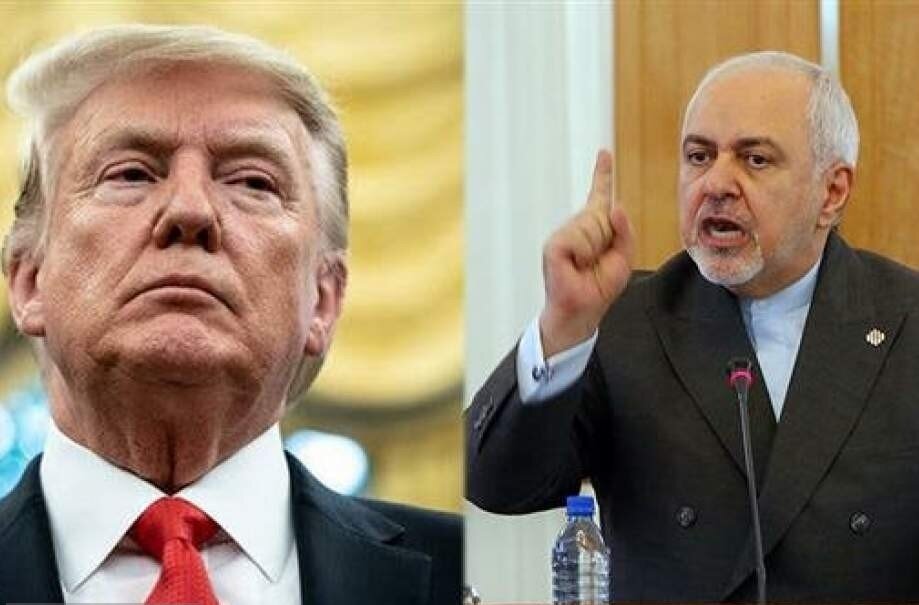Trump promises 'snapback' sanctions, Zarif says U.S. can't do it

TEHRAN - U.S. President Donald Trump vowed Saturday to use a controversial technique to unilaterally reinstate UN sanctions on Tehran.
His declaration came a day after the UN Security Council overwhelmingly rejected a U.S. resolution to extend an Iranian arms embargo.
"We'll be doing a snapback," Trump said during a news conference at his New Jersey golf club, AFP reported.
"You'll be watching it next week," he added.
Trump was referring to the contested argument that the U.S. remains a "participant" in the 2015 Iran nuclear deal -- despite Trump's withdrawal from it -- and therefore can force a return to sanctions if it sees Iran as being in violation of its terms.
However, Iranian Foreign Minister Mohammad Javad Zarif said the U.S. itself is well aware that it cannot do it as Washington is no longer a party to the agreement.
“The U.S. knows that it cannot use snapback,” Zarif said as he introduced Iran’s new Foreign Ministry spokesman.
“The U.S. snapback (claim) is so illegal that it is not acceptable and the Americans themselves known it,” noted Zarif, a professor international law.
Iranian President Hassan Rouhani said the U.S. had failed to kill off the "half alive".
"The United States failed in this conspiracy with humiliation," said Rouhani.
"This day will go down in the history of our Iran and in the history of fighting global arrogance."
Only two of the Council's 15 members voted in favor of the U.S. resolution seeking to extend the embargo, highlighting the division between Washington and its European allies since Trump withdrew from the nuclear accord in 2018.
The Europeans on the Council all abstained.
"In the 75 years of United Nations history, America has never been so isolated," Foreign Ministry spokesman Abbas Mousavi tweeted.
European allies have been skeptical on whether Washington can force sanctions, with experts saying a "snapback" threatens to plunge the Council into one of its worst-ever diplomatic crises.
Trump also said Saturday he would "probably not" take part in a summit proposed by Russian President Vladimir Putin on addressing the situation.
"I think we'll wait until after the election," he said, with the U.S. set to hold its presidential poll in November.
Putin had appealed to China, France, Britain, the U.S., Germany, and Iran to convene an emergency video summit to avoid an escalation of tensions in the Persian Gulf.
U.S. Secretary of State Mike Pompeo, on a visit to Poland on Saturday, made it clear the United States would press on.
"It is unfortunate that the French and the United Kingdom... didn't support what the (Persian) Gulf states have demanded, what the Israelis have demanded... I regret that deeply," Pompeo told reporters.
"The United States is determined to make sure that the Iranians and this regime, this theocratic regime does not have the capacity to inflict even more harm on the world."
Israeli Prime Minister Benjamin Netanyahu denounced a "scandalous" UN vote.
"Iranian terrorism and aggression threaten the peace of the region and the entire world. Instead of opposing weapons sales, the Security Council is encouraging them," he said.
The embargo on conventional arms is due to expire on October 18 under the terms of a resolution that blessed the Iran nuclear deal, officially known as the Joint Comprehensive Plan of Action.
Since Trump pulled out of the JCPOA and slapped unilateral sanctions on Iran, Tehran has taken small but escalatory steps away from compliance with the accord as it presses for sanctions relief.
European allies of the United States -- who, along with Russia and China, signed the deal with Iran -- have voiced support for extending the 13-year-long conventional arms embargo, claiming an expiry threatens stability in the Middle East.
However, their priority is to preserve the JCPOA.
The U.S. text at the Security Council on Friday, seen by AFP, effectively called for an indefinite extension of the embargo on Iran, which diplomats said would threaten the nuclear deal.
Iran says it has the right to self-defense and that a continuation of the ban would mean an end to the agreement.
Apart from 11 abstentions, Russia and China opposed the resolution.
"The result shows again that unilateralism enjoys no support, and bullying will fail," China's UN mission tweeted.
Iranian presidential chief of staff Mahmoud Vaezi said on Sunday that the United States will again face defeat if it triggers the snapback mechanism.
“In the [UN] Security Council vote, the international community once again opposed the U.S.’s unilateralism by protecting Barjam (nuclear deal),” Vaezi wrote in a tweet on Sunday.
“The U.S., continuing its mistakes, is seeking to trigger the snapback mechanism,” he wrote, adding, “With the same process that the recent resolution was rejected but even with a stronger political and legal argument, it will face defeat again.”
Vaezi said Trump should have learned that politics is completely different from trade and “if he won’t change his past policies, he should await consecutive defeats.”
MH/PA
Leave a Comment